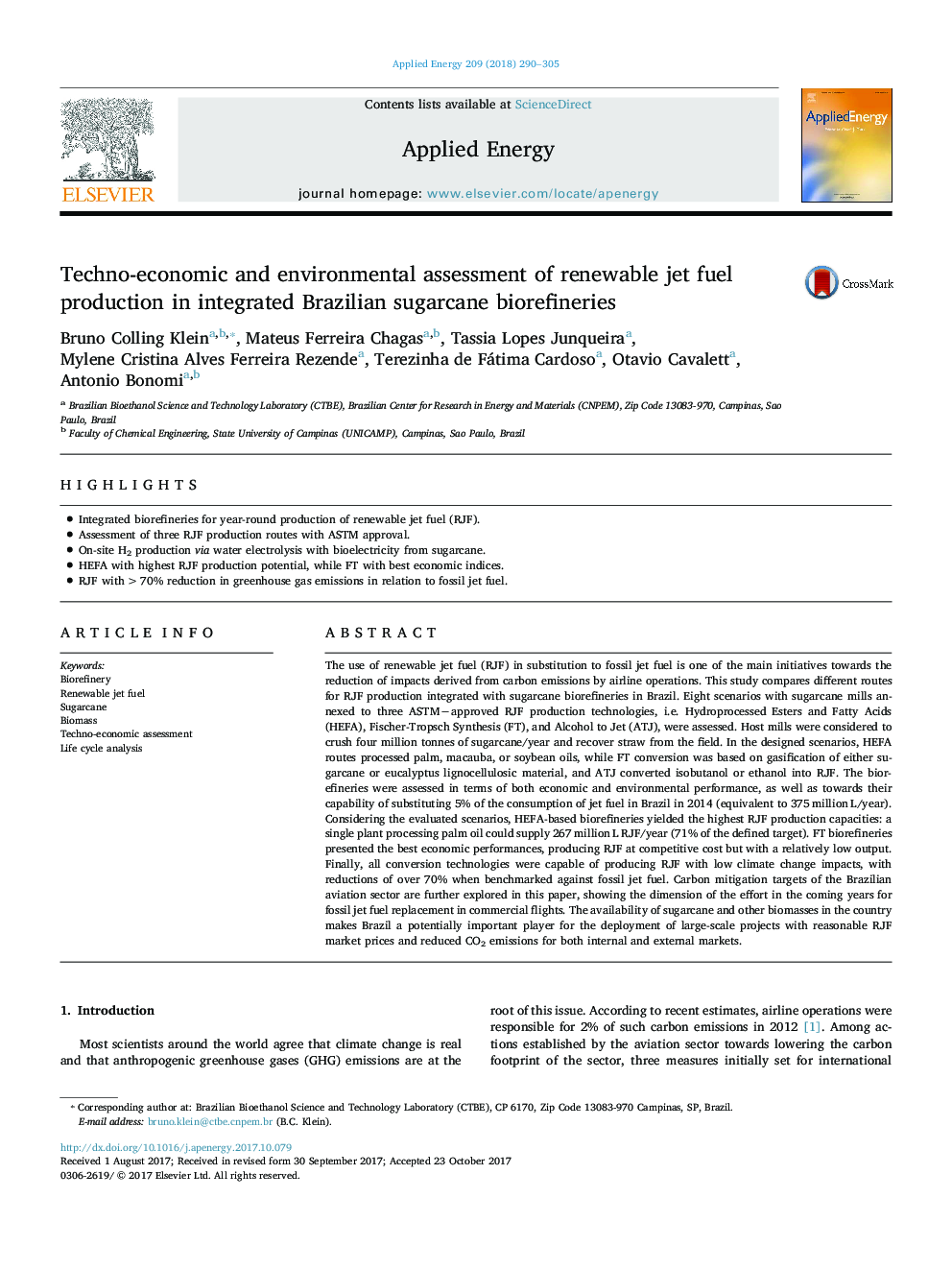| کد مقاله | کد نشریه | سال انتشار | مقاله انگلیسی | نسخه تمام متن |
|---|---|---|---|---|
| 6681553 | 1428081 | 2018 | 16 صفحه PDF | دانلود رایگان |
عنوان انگلیسی مقاله ISI
Techno-economic and environmental assessment of renewable jet fuel production in integrated Brazilian sugarcane biorefineries
ترجمه فارسی عنوان
ارزیابی تکنولوژیکی اقتصادی و محیط زیست تولید سوخت جت سوخت تجدیدپذیر در یکپارچه سازی یکپارچه برنجی نیشکر
دانلود مقاله + سفارش ترجمه
دانلود مقاله ISI انگلیسی
رایگان برای ایرانیان
کلمات کلیدی
موضوعات مرتبط
مهندسی و علوم پایه
مهندسی انرژی
مهندسی انرژی و فناوری های برق
چکیده انگلیسی
The use of renewable jet fuel (RJF) in substitution to fossil jet fuel is one of the main initiatives towards the reduction of impacts derived from carbon emissions by airline operations. This study compares different routes for RJF production integrated with sugarcane biorefineries in Brazil. Eight scenarios with sugarcane mills annexed to three ASTMâapproved RJF production technologies, i.e. Hydroprocessed Esters and Fatty Acids (HEFA), Fischer-Tropsch Synthesis (FT), and Alcohol to Jet (ATJ), were assessed. Host mills were considered to crush four million tonnes of sugarcane/year and recover straw from the field. In the designed scenarios, HEFA routes processed palm, macauba, or soybean oils, while FT conversion was based on gasification of either sugarcane or eucalyptus lignocellulosic material, and ATJ converted isobutanol or ethanol into RJF. The biorefineries were assessed in terms of both economic and environmental performance, as well as towards their capability of substituting 5% of the consumption of jet fuel in Brazil in 2014 (equivalent to 375â¯millionâ¯L/year). Considering the evaluated scenarios, HEFA-based biorefineries yielded the highest RJF production capacities: a single plant processing palm oil could supply 267â¯millionâ¯Lâ¯RJF/year (71% of the defined target). FT biorefineries presented the best economic performances, producing RJF at competitive cost but with a relatively low output. Finally, all conversion technologies were capable of producing RJF with low climate change impacts, with reductions of over 70% when benchmarked against fossil jet fuel. Carbon mitigation targets of the Brazilian aviation sector are further explored in this paper, showing the dimension of the effort in the coming years for fossil jet fuel replacement in commercial flights. The availability of sugarcane and other biomasses in the country makes Brazil a potentially important player for the deployment of large-scale projects with reasonable RJF market prices and reduced CO2 emissions for both internal and external markets.
ناشر
Database: Elsevier - ScienceDirect (ساینس دایرکت)
Journal: Applied Energy - Volume 209, 1 January 2018, Pages 290-305
Journal: Applied Energy - Volume 209, 1 January 2018, Pages 290-305
نویسندگان
Bruno Colling Klein, Mateus Ferreira Chagas, Tassia Lopes Junqueira, Mylene Cristina Alves Ferreira Rezende, Terezinha de Fátima Cardoso, Otavio Cavalett, Antonio Bonomi,
